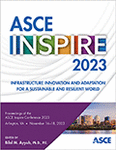Community-Level Approach for a Socio-Physical Flood Post-Hazard Functionality Assessment
Publication: ASCE Inspire 2023
ABSTRACT
Modeling community resilience to flood hazards has gained substantial interest over the past two decades due to the increased risk from climate change and urbanization. Climate change increases both the frequency and intensity of some natural hazards, which is further exacerbated by urbanization. Post-hazard functionality assessment of buildings and communities following flood hazards is crucial for risk- and resilience-informed decisions. Although modeling building damage is essential to quantify the post-hazard functionality, it is insufficient for a comprehensive community resilience assessment. In this research developed a comprehensive flood post-hazard functionality model by chaining engineering models for damage prediction with socio-economic models. This approach accounts for the complex physical, social, and economic interdependencies between the different systems within the community. This approach is intended to be the first step in a comprehensive socio-physical community resilience model that can inform resilience-based decisions for buildings and communities.
Get full access to this article
View all available purchase options and get full access to this chapter.
REFERENCES
Balomenos, G. P., Hu, Y., Padgett, J. E., and Shelton, K. Impact of coastal hazards on residents’ spatial accessibility to health services. Journal of Infrastructure Systems 2019;25:04019028.
Burton, H. V., Deierlein, G., Lallemant, D., and Lin, T. (2016). Framework for incorporating probabilistic building performance in the assessment of community seismic resilience. Journal of Structural Engineering, 142(8), C4015007.
Chinh, D. T., Dung, N. V., Gain, A. K., and Kreibich, H. (2017). “Flood loss models and risk analysis for private households in Can Tho City, Vietnam.” Water, Multidisciplinary Digital Publishing Institute, 9(5), 313.
Coles, D., Yu, D., Wilby, R. L., Green, D., and Herring, Z. Beyond ‘flood hotspots’: Modelling emergency service accessibility during flooding in York, UK. Journal of Hydrology 2017;546:419–36. https://doi.org/10.1016/j.jhydrol.2016.12.013.
FEMA. (2021). HAZUS inventory technical manual.
Figueiredo, R., Romão, X., and Paupério, E. (2021). “Component-based flood vulnerability modelling for cultural heritage buildings.” International Journal of Disaster Risk Reduction, Elsevier, 61, 102323.
Green, D., et al. City-scale accessibility of emergency responders operating during flood events. Natural Hazards and Earth System Sciences 2017;17:1–16. https://doi.org/10.5194/nhess-17-1-2017.
Hemmati, M., Ellingwood, B. R., and Mahmoud, H. N. (2020). “The Role of Urban Growth in Resilience of Communities under Flood Risk.” Earth’s Future, Wiley Online Library, 8(3), e2019EF001382.
Hirabayashi, Y., Mahendran, R., Koirala, S., Konoshima, L., Yamazaki, D., Watanabe, S., Kim, H., and Kanae, S. (2013). “Global flood risk under climate change.” Nature Climate Change, Nature Publishing Group, 3(9), 816–821.
HIFLD (Homeland Infrastructure Foundation Level Database). (Sept, 2021). Substations dataset, url=https://hifld-geoplatform.opendata.arcgis.com/datasets/electric-substations/, accessed.
Klise, K. A., Hart, D. B., Moriarty, D., Bynum, M., Murray, R., Burkhardt, J., and Haxton, T. (2017). Water Network Tool for Resilience (WNTR) User Manual, US Environmental Protection Agency, 47p.
Lin, P., and Wang, N. (2017a). Stochastic post-disaster functionality recovery of community building portfolios I: Modeling. Structural Safety, 69, 96–105.
Lin, P., and Wang, N. (2017b). Stochastic post-disaster functionality recovery of community building portfolios II: Application. Structural Safety, 69, 106–117.
Martínez-Gomariz, E., Forero-Ortiz, E., Guerrero-Hidalga, M., Castán, S., and Gómez, M. (2020). “Flood Depth‒Damage Curves for Spanish Urban Areas.” Sustainability, Multidisciplinary Digital Publishing Institute, 12(7), 2666.
Mitsova, D., Escaleras, M., Sapat, A., Esnard, A. M., and Lamadrid, A. J. (2019). The effects of infrastructure service disruptions and socio-economic vulnerability on hurricane recovery. Sustainability, 11(2), 516.
Nofal, O. M., and van de Lindt, J. W. (2020a). “Probabilistic Flood Loss Assessment at the Community Scale: Case Study of 2016 Flooding in Lumberton, North Carolina.” ASCE-ASME Journal of Risk and Uncertainty in Engineering Systems, Part A: Civil Engineering, American Society of Civil Engineers, 6(2), 5020001.
Nofal, O. M., and van de Lindt, J. W. (2020b). “Understanding Flood Risk in the Context of Community Resilience Modeling for the Built Environment: Research Needs and Trends.” Sustainable and Resilient Infrastructure, 5(1), 1–17.
Nofal, O. M., van de Lindt, J. W., and Do, T. Q. (2020). “Multi-variate and Single-Variable Flood Fragility and Loss Approaches for Buildings.” Reliability Engineering and System Safety.
Nofal, O. M., van de Lindt, J. W., Cutler, H., Shields, M., and Crofton, K. “Modeling the Impact of Building-Level Flood Mitigation Measures Made Possible by Early Flood Warnings on Community-Level Flood Loss Reduction.” Buildings 11, no. 10 (2021): 475.
Pala, O., Wilson, D., Bent, R., Linger, S., and Arnold, J. (2014, March). Accuracy of service area estimation methods used for critical infrastructure recovery. In International Conference on Critical Infrastructure Protection (pp. 173–191). Springer, Berlin, Heidelberg.
Salman, A. M., and Li, Y. (2018). “Flood Risk Assessment, Future Trend Modeling, and Risk Communication : A Review of Ongoing Research.” Natural Hazards Review, 19(3), 04018011.
Ulak, M. B., Kocatepe, A., Konila Sriram, L. M., Ozguven, E. E., and Arghandeh, R. (2018). Assessment of the hurricane-induced power outages from a demographic, socioeconomic, and transportation perspective. Natural hazards, 92, 1489–1508.
Information & Authors
Information
Published In
History
Published online: Nov 14, 2023
ASCE Technical Topics:
- Buildings
- Business management
- Climate change
- Climates
- Disaster risk management
- Disasters and hazards
- Environmental engineering
- Floods
- Infrastructure
- Infrastructure resilience
- Natural disasters
- Practice and Profession
- Risk management
- Social factors
- Structural engineering
- Structures (by type)
- Urban and regional development
- Urban areas
- Water and water resources
Authors
Metrics & Citations
Metrics
Citations
Download citation
If you have the appropriate software installed, you can download article citation data to the citation manager of your choice. Simply select your manager software from the list below and click Download.
